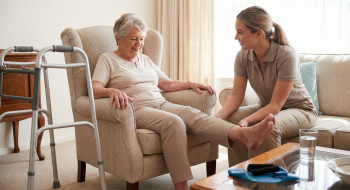Helping Seniors Maintain Healthy Knees
November 24, 2025

Knee health becomes increasingly important as people age, yet many seniors find themselves struggling to maintain the routines and habits that keep their joints strong and pain-free. This is where companion care at home can make a meaningful difference, offering support that goes far beyond basic assistance.
Understanding Common Knee Concerns
The knees bear the weight of daily living, and over time, they naturally experience wear and tear. For instance, osteoarthritis affects millions of older adults, causing the protective cartilage between bones to break down. This leads to stiffness, swelling, and discomfort that can make even simple activities feel challenging. Some seniors also deal with past injuries that have never quite healed properly or conditions like tendonitis that flare up with certain movements.
What many seniors don't realize is that knee problems often create a challenging cycle. Pain leads to less movement, which weakens the muscles supporting the knee, which then causes more pain. Breaking this cycle requires consistent attention and care, something that becomes harder when living alone.
The Role of Daily Support
Companion care at home helps seniors stay on top of the small but important tasks that protect knee health. They can provide gentle reminders to take prescribed medications at the right times, ensuring that anti-inflammatory medications or supplements work as intended. They also encourage movement throughout the day, preventing the stiffness that comes from sitting too long in one position.
Additionally, while seniors may have been prescribed recommended exercises by their medical team or physical therapist, many are not always motivated to be consistent. A caregiver can make these exercises part of a daily routine, participating alongside them or simply offering encouragement. This social aspect often makes the difference between exercises that get done and those that get forgotten.
Making Healthy Habits Easier
Maintaining a healthy weight is one of the most effective ways to reduce knee strain, as extra pounds put additional pressure on already sensitive joints. Companion care at home assists with meal planning and preparation, making it easier for seniors to eat nutritious foods rather than relying on convenience options. They can also go with seniors on walks around the neighborhood, turning exercise into a pleasant social activity rather than a chore.
Caregivers also offer practical support with everyday tasks, which is particularly helpful when those tasks aggravate knee problems. For instance, they can handle activities that require excessive bending, kneeling, or climbing stairs. In addition, caregivers can also ensure the home environment stays safe by reducing clutter that might cause trips or falls that could further damage vulnerable knees.
Noticing Changes
Having a consistent caregiver in the home also makes it easier to notice subtle changes that suggest knee pain might be getting worse, such as swelling or reduced movement. This early awareness means problems can be addressed before they become serious. Perhaps even more importantly, caregivers can encourage seniors to talk with healthcare providers about their pain and concerns.
For many seniors, companion care at home transforms knee health from a source of worry into something manageable, allowing them to maintain independence and enjoy their daily lives with greater comfort and confidence.
If you or your loved one is looking for Companion Care at Home in Saratoga, CA, please call Familiar Surroundings Home Care.
Santa Clara County: (408) 979-9990
San Mateo County: (650) 353-9777
Santa Cruz County: (831) 480-3990


